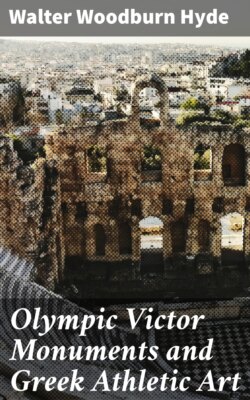Читать книгу Olympic Victor Monuments and Greek Athletic Art - Walter Woodburn Hyde - Страница 8
На сайте Литреса книга снята с продажи.
ATHLETICS IN HOMER.
ОглавлениеTable of Contents
We have evidence, therefore, that the love of sport existed in Crete as it has existed in all countries since. But the comparatively unathletic character of the Aegean culture is shown by the complete absence of athletic representations—apart from bull-grappling scenes—in the art of its last phase at Mycenæ and Tiryns on the mainland. This is an independent argument for the view that the civilization of the mainland was chiefly the product of the old Mediterranean stock, which was finally conquered by the invading Achæans, who are represented in Homer as skilled gymnasts. In Homer we are immediately conscious of being in another world, for here we are in an atmosphere of true athletics, which are fully developed and quite secular in character.34 They are, however, wholly spontaneous, for there are as yet neither meets nor organized training, neither stadia, gymnasia, nor palæstræ; for such an organization of athletics did not exist until the sixth century B.C. But Homer’s account of the funeral games of Patroklos is pervaded by a spirit of true athletics and has a perennial attraction for every lover of sport. Walter Leaf says of the chariot-race, which is the culminating feature of the description, that it is “a piece of narrative as truthful in its characters as it is dramatic and masterly in description.”35 Such a description could have been composed only by a poet who belonged to a people long acquainted with athletics and intensely interested in them. Nestor often speaks of a remoter past, when the gods and heroes contended. Odysseus says he could not have fought with Herakles nor Eurytos, heroes of the olden time, “who contended with the immortal gods.” The Homeric warrior was distinguished from the merchant by his knowledge of sport. Thus Euryalos of the Phaiakians says in no complimentary tone to Odysseus: “No truly, stranger, nor do I think thee at all like one that is skilled in games ... rather art thou such an one as comes and goes in a benched ship, a master of sailors that are merchantmen, one with a memory for his freight, or that hath charge of a cargo homeward bound, and of greedily gotten gains.”36 It is beside the point whether the chief passages in the poems which relate to sports are late in origin or not, even if they are later than 776 B.C., the traditional first Olympiad. In any case the later poet merely followed an older tradition. At the funeral games of Patroklos all the events are practical in character, the natural amusements of men chiefly interested in war. They are, however, not merely military, but are truly athletic. The oldest and most aristocratic of all the events described is the chariot-race—in which the war-chariot is used—the monopoly of the nobles then, as it was always later the sport of kings and the rich.37 Boxing and wrestling come next in importance, already occupying the position of preëminence which they hold in the poems of Pindar. The foot-race between Ajax, the son of Oileus, and Odysseus follows. Of the last four events, three—the single combat between Ajax and Diomedes, the throwing of the solos, and the contest in archery—are admitted to be late additions. The last event of all, the casting of the spear, may be earlier, but we know little about it, as the contest did not take place, Achilles yielding the first prize to Agamemnon. Most of these later events are described in a lifeless manner and have not the vim and compelling interest of the earlier ones. Indeed the contest in archery seems to be treated with a certain amount of ridicule, which shows the contempt of the great nobles for so plebeian a sport. The armed contest, though it is pictured in art certainly as early as the sixth century B.C.,38 never had a place in the later Greek games.39 Jumping, an important part of the later pentathlon, is mentioned but once in the poems, as a feature of the sports of the Phaiakians. But the later pentathlon, as Gardiner says, is certainly not suggested in Homer’s account, though many have assumed it,40 merely because Nestor mentions his former contests at Bouprasion in boxing, in running, in hurling the spear, and in the chariot-race.41 This, however, is not the combination of contests known much later as the pentathlon, in which the same contestants had to compete in the series of events—running, jumping, wrestling, diskos-throwing, and javelin-throwing.
